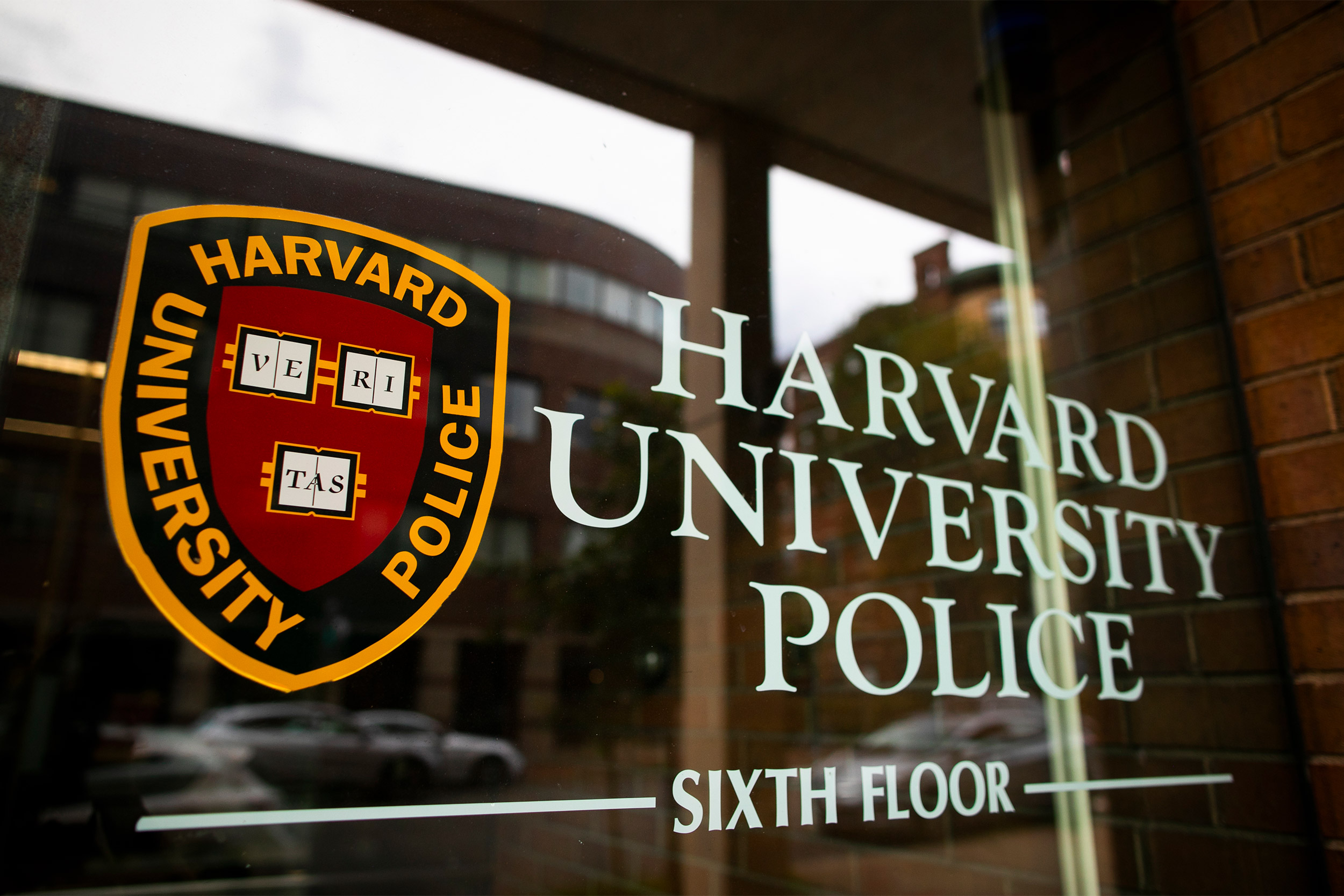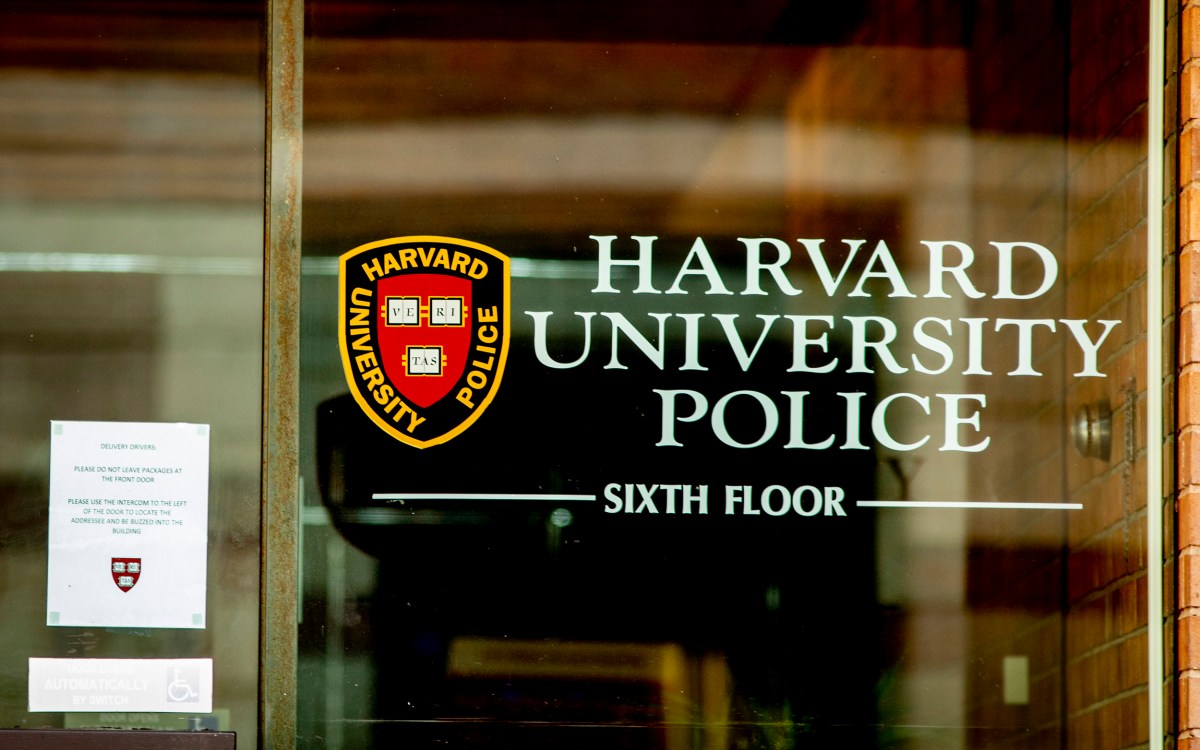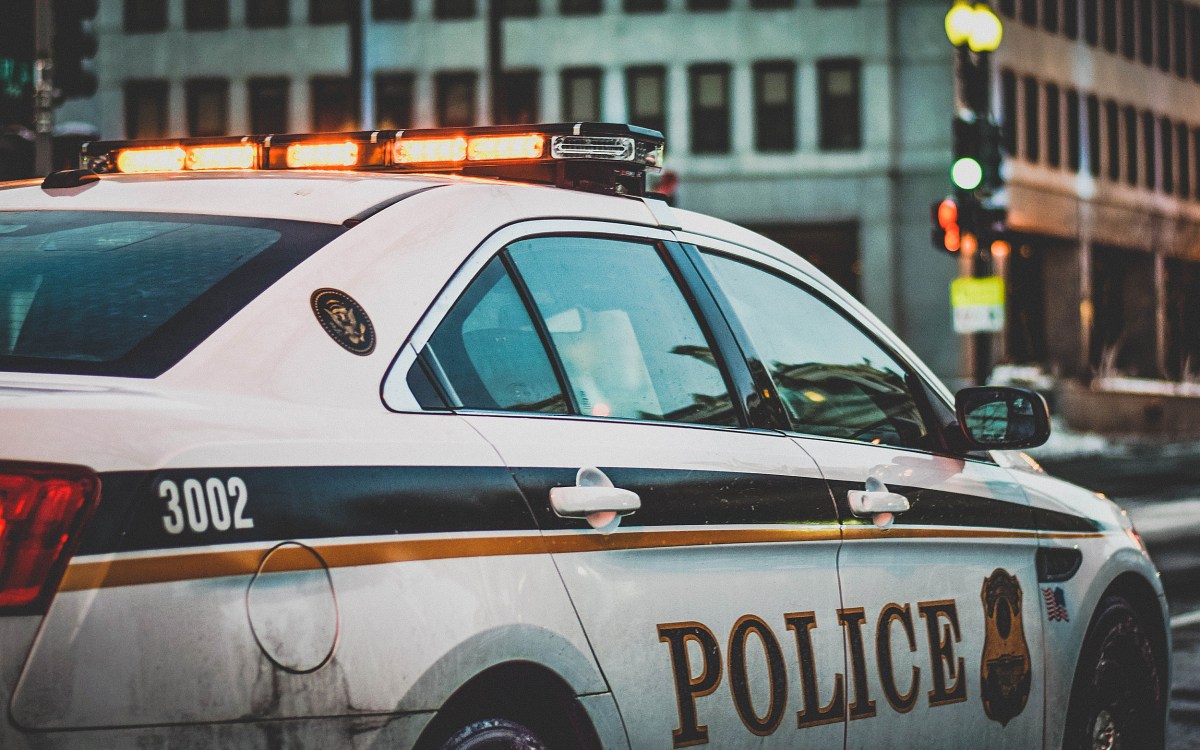
Stephanie Mitchell/Harvard Staff Photographer
How to make a better Harvard Police Department
Review committee details process, and how their findings may inform search for new chief
Earlier this year, Harvard initiated an external review of the Harvard University Police Department (HUPD), focusing on its internal practices and procedures as well as its interactions with community members. The University hired 21CP Solutions to conduct the review, and the consulting firm’s findings will be released publicly during the fall.
Separately, Harvard has begun a nationwide search for a new police chief to replace Francis D. “Bud” Riley, who is retiring at year’s end. The new chief will be charged with implementing recommendations emerging from 21CP Solutions’ report, and University leadership will be able to consult all the material while considering candidates.
The Gazette spoke with review committee members Ron Davis, former director of the U.S. Department of Justice, Office of Community Oriented Policing Services, now with 21CP Solutions; Brenda Bond, professor of public administration, Institute for Public Service, Suffolk University; and Matthew Barge, police practices expert and civil rights attorney, also with 21CP, to learn more about how they are working with community members across Harvard to reimagine HUPD’s role moving forward.
Q&A
Ron Davis, Brenda Bond, and Matthew Barge
GAZETTE: Could you begin by talking about how the ongoing nationwide debate about the role of the police might inform your work as reviewers?
BOND: We could not conduct a review like this without situating it within the national conversation about the role of public safety officers and their relationships with the communities they serve. The conversations that communities like Harvard should be having within themselves — such as the role of the police and how community members and police officers should interact with each other — are the same ones taking place nationally. Also, because of the University’s diversity, Harvard has individuals who come to campus with different conceptions of what policing is and who may have had very different experiences with the police in their own lives. We’re meeting with diverse voices from across Harvard to implement a variety of points of view in the recommendations we’ll make to the University.
DAVIS: The issues of systemic racism, diversity, and the disparate treatment of individuals from differing backgrounds are a part of our society on the whole, and this is why it’s so important to come up with new, improved systems that are fair and equitable, no matter where we are. Engaging in an external review at this time comes with a responsibility to better understand these issues and how they relate to public safety and with a commitment to learn from the lessons of history.
GAZETTE: All of you have extensive experience advising organizations, or towns and municipalities, on public safety. What are some of the guiding principles and approaches that you take when conducting an external review of a police department such as HUPD?
DAVIS: An external review is designed to help an organization make future decisions. We start by looking at the existing day-to-day operations and the culture of, in this case, the HUPD, to see that they are consistent with industry best practices and with the expectations of the community. First you have to see what the department says on paper. What is expected of their officers according to the policies and protocols that the department has put in place? We’ll also take a look at how the officers are trained and if this training is consistent with these policies. We’ll learn more about how officers have conducted themselves and if they have done so in a manner that’s consistent with the expectations of the department itself and with the community they serve. To make an assessment, we have to speak with the stakeholders involved. At Harvard, this means meeting with students, faculty, and staff to see if the values of the University community are reflected in the work of the HUPD. And then we need to adopt a forward-looking lens by learning from existing points of views and from past experiences in order to make things work better.
“If you can’t treat each other within your department with dignity and respect … then there’s no expectation that you would do that for your students, faculty, and staff.”
Ron Davis
BOND: Through this assessment, we’ll work to help Harvard understand if, at this time and in this place, and in this context, is it, as an organization, living up to the expectations of the community. Context is so important. There are ideas that may have been great ones before, but no longer are, that we may be able to help Harvard to revisit. We’re clearly at a crossroads here in America, where across the country, institutions are reflecting on what public safety should look like. An assessment such as this is exactly the type of exercise that a self-reflective, proactive, and adaptive organization should engage in in thinking about their path ahead during changing times.
GAZETTE: The realities of campus policing are unique. Does this affect the way in which you approach a review of a University-based police force such as HUPD?
DAVIS: Certainly there are differences between each department that we review. But the approach is consistent. Our job is to listen to the expectations — of the community, of the University leadership, of the officers within the police department — and to hold the department to the standards that we see reflected in our conversations.
GAZETTE: Talk about how critical it is to engage community members in an external review such as this one.
BARGE: It’s so important for us to be able to truly listen to individuals throughout this process. The dynamics of the space are that, like with many other things, it takes some time for people to get warmed up. But then people start talking to each other, and they begin to exchange different viewpoints. We ask primarily clarifying questions during the listening sessions we conduct, and often, those individuals involved begin to recognize that they have more in common with each other than they may have previously believed. I find this to be especially true in a university setting, where, while individual experiences may be very different, there are at least nuances to being a part of a similar institution that can be shared and which can get people talking about very specific solutions that are at least able to be understood. I would also say, though, it’s impossible to gain an exhaustive, comprehensive census of community views and inputs. Throughout our process, we’re talking to as many different types of stakeholders as we can, in order to propose pathways forward. But as we make our recommendations for moving ahead, it will be important for the University to continue to invite the input of community members, including those who weren’t able to participate in the review process, to be a part of the long-term solution, as well.
“Context is so important. There are ideas that may have been great ones before, but no longer are, that we may be able to help Harvard to revisit.”
Brenda Bond
GAZETTE: Throughout this process, you are looking at how the HUPD successfully and, sometimes, less successfully interacts with its community members. Of course, you’re talking to people about their own personal experiences, but to do this, as Ron previously mentioned, you’re also spending time investigating the practices of the department itself, such as how it hires people, and how it trains them. Could you talk more about how this look internally lends critical perspective to your review, and ultimately, to the takeaways that the University will need to adopt in the future?
DAVIS: How a police department operates internally has a great impact on the services it provides to the community at large. We are looking into, for example, the nature of internal complaints within the department and what we can learn about the organizational culture. Hiring and training have a lot to do with how this culture is defined. If you can’t treat each other within your department with dignity and respect and if you can’t bring in like-minded individuals who also treat individuals with dignity and respect, then there’s no expectation that you would do that for your students, faculty, and staff.
BOND: I would also add that the Harvard community is particularly sensitive to the internal aspects of the HUPD and what may have taken place in the past, and this reality affects perceptions of the legitimacy of the department itself. Whether an individual either has a perspective directly from their own experience or if they have read about or heard about problems inside the department, even if what they’ve heard is unfounded, it directly impacts the way they perceive individual officers on campus and how they prepare themselves to interact with those officers. The review should look inward and outward to understand where there are alignments, and where there aren’t, between what happens inside the HUPD and what happens, or is perceived to be happening, outside of it.
GAZETTE: Concurrently to the external review of the HUPD, Harvard has begun the process of hiring a police chief to replace Francis D. “Bud” Riley, who is retiring at the end of the year. How can your work help to inform the direction the new chief adopts when he or she takes office?
DAVIS: The recommendations that are ultimately submitted provide the new chief with a real opportunity to advance the department and become a national model in 21st-century policing. More than a simple investigation of a department’s practices, an external review such as this one has the opportunity to provide a transformational moment in University history. Thanks to the input of the many community members who have taken the time, and who will continue to take the time, to share their perspectives, this review can provide a holistic roadmap for the new chief on how to begin to create positive change.
Interview was lightly edited for clarity and length. Any Harvard community member may offer feedback to the external review team and the police chief search committee by email to hupdexternalreview@harvard.edu and hupdchiefsearch@harvard.edu.







